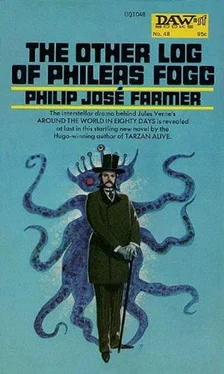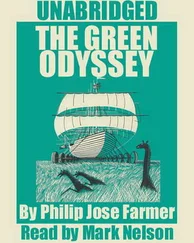Philip Farmer - The Other Log of Phileas Fogg
Здесь есть возможность читать онлайн «Philip Farmer - The Other Log of Phileas Fogg» весь текст электронной книги совершенно бесплатно (целиком полную версию без сокращений). В некоторых случаях можно слушать аудио, скачать через торрент в формате fb2 и присутствует краткое содержание. Жанр: Фантастика и фэнтези, на английском языке. Описание произведения, (предисловие) а так же отзывы посетителей доступны на портале библиотеки ЛибКат.
- Название:The Other Log of Phileas Fogg
- Автор:
- Жанр:
- Год:неизвестен
- ISBN:нет данных
- Рейтинг книги:3 / 5. Голосов: 1
-
Избранное:Добавить в избранное
- Отзывы:
-
Ваша оценка:
- 60
- 1
- 2
- 3
- 4
- 5
The Other Log of Phileas Fogg: краткое содержание, описание и аннотация
Предлагаем к чтению аннотацию, описание, краткое содержание или предисловие (зависит от того, что написал сам автор книги «The Other Log of Phileas Fogg»). Если вы не нашли необходимую информацию о книге — напишите в комментариях, мы постараемся отыскать её.
The Other Log of Phileas Fogg — читать онлайн бесплатно полную книгу (весь текст) целиком
Ниже представлен текст книги, разбитый по страницам. Система сохранения места последней прочитанной страницы, позволяет с удобством читать онлайн бесплатно книгу «The Other Log of Phileas Fogg», без необходимости каждый раз заново искать на чём Вы остановились. Поставьте закладку, и сможете в любой момент перейти на страницу, на которой закончили чтение.
Интервал:
Закладка:
After making sure that Passepartout could not imitate Nemo’s feat, the two would proceed toward the bow. One would come along the port rail; one, by the starboard rail. Their paths would converge at the place where Fogg now stood. He could attack one with his sword, but the other would quickly join the man he attacked. At point-blank range, they would not miss.
The fore deckhouse was about thirteen feet square and six feet above the deck. It would contain the fo’c’sle or crew’s quarters, the galley, and, perhaps, a cabin for the second mate. It would not afford a good hiding place or even a mediocre one.
Fogg looked upward. He could still run to one of the rope ladders formed of transverse ropes called ratlines and attached to the shrouds, pairs of ropes from the mastheads which gave lateral support to the masts. If he went up a ladder, he could at least get away from them for a while. If he then went out onto the yards, he would force them to use both hands while getting close enough to him so they would not waste their bullets. Perhaps he could attack them then with his sword. If he were an acrobat such as Passepartout, he might go up the main mast to one of the middle triangular sails and ascend by its ropes to the aft mast. If he could get down quickly enough, while the two were still aloft, he could seize the wheel and change the direction of the ship. If it swung around violently enough, it might dislodge the two.
Fogg did not, however, follow his desperate plan.
Instead, he slid open the wooden door on the forward cabin and darted inside. This was on the port side of the deckhouse and seemed to be the second mate’s. It held a sea chest the examination of which Fogg deferred. He went through another sliding door into the crew’s quarters, placed closest to the bow. His log does not mention his feelings at this point, but we may suppose that even the face of the imperturbable Fogg lit up with delight.
There, as he had hoped, was the watch, taped to the ceiling of the fo’c’sle. He tore it loose and, holding it to his ear, ran out of the entrance onto the deck of the bow.
The watch was emitting, in Eridanean code, a stream of ringing sounds. Aouda had set her distorter on receive.
If he set the Capellean distorter for transmit he could escape. That meant leaving the enemy distorter, Passepartout, and the explanation of the mystery of the ship behind him. As for the first, he must submit to it if he were transmitted. As for the third, it was better to survive at the price of ignorance. As for the second, it was probable that Passepartout was dead. He was doomed even if Fogg stayed here and tried to fight with only the sword.
He stood for about five seconds, five seconds during which his enemies would be approaching.
Six seconds after this, the two Capelleans were dismayed-and deafened again-when nine clanging sounds seemed to tear the air around them and buffet their eardrums. Both, we may presume, swore at the same time they turned pale. Both, we know, started to run into the cabin under the assumption that they would find only the device. The foxy Eridanean had undoubtedly taken the only way out. He must have removed the distorter from the ceiling and taped it to the underside of a table and been transmitted back to the General Grant.
Nemo must have been blaming himself for not having first retrieved the device. But he could console himself with the thought that if he had done so, he, instead of Fogg, might have been trapped in the deckhouse.
The Capelleans met at the forward entrance of the deckhouse. The sailor arrived first and so was ahead of Nemo in entering the fo’c’sle. He halted because, to his astonishment, the watch was still taped to the ceiling. That was all he saw. The edge of Fogg’s sword struck the top of his head. He dropped; the revolver fell from his hand. And Fogg picked up the revolver.
And Nemo? After the first moment of chagrin, not unmixed with panic, he backed out of the companionway.
The affair had not suddenly become reversed. It had just evened out. Neither side held a particular advantage at this moment. Both were armed. Fogg was shut up in the deckhouse, but Nemo was losing blood and strength.
The gray-eyed man got onto the top of the deckhouse and proceeded to remove his coat and his shirt. He tore his shirt into strips and bound them around the arm. The wound, fortunately, was only a flesh wound, and blood seemed to stop flowing after a few moments. Nevertheless, he might as well have had only one arm, and the gorilla-like power of his muscles had drained out of him.
He decided that he could afford to desert his post for a few minutes. Fogg would not dare to make a dash for the outside. At least, not for a while. Nemo would finish off the other fellow and then return to the deckhouse. Fogg would still be crouching near a bulkhead or under some furniture. He would know that Nemo could break the deckhouse windows and fire from there. If he had not been so overwhelmed by the thought of Fogg escaping, he would have done that at once. Of course, if he did use the windows, he stood a good chance of receiving Fogg’s bullets in his face. It would be discreet to remain away from them.
Eventually, Fogg would be driven out of the deckhouse by thirst and hunger. He would not have access to the galley. Nemo had ascertained from his chief that the galley was partitioned off from the fo’c’sle and second mate’s cabin. Even if Fogg knocked a hole through the partition, he would not find much food. Most of the supplies were kept in the pantry, which was in the deckhouse aft.
Nemo moved softly away from the roof of the deckhouse only because it was his nature to do so. He did not have to fear that Fogg would hear him. Fogg would still be deafened by the clangings.
Nemo had proceeded about thirty feet toward the stern when the nine clangings struck again. He whirled. What the devil was Fogg doing now?
Had he indeed departed this time? Or was he setting the same trap? And, if he had gone, would he not be quickly back with help? There was nothing to prevent Fogg from setting the distorter to revert automatically to receive within a certain time.
But Fogg might be hoping that he would think just this and so rush in to turn the distorter off before Fogg & Company would return.
Nemo was in a highly indecisive state, a foreign one to this man of great intelligence and speedy action. If he entered either entrance to the fore deckhouse, he would be exposed to fire from a man whose coolness and accuracy with arms had been proven in Bundelcund.
Moreover, Fogg would be in semidarkness. The windows were covered by shutters, and while he could destroy these to let some light in, he would be exposed. Fogg would expect him to try that and so would be ready for him. The deckhouse was built of thin planking through which Fogg’s bullets could find him even if Nemo stood to one side while tearing off the canvas coverings.
He stood on the deck for a minute, and then he turned away. If only Fogg did not find the papers on the chief. The distorter itself would have to be abandoned. That could not be helped.
And if only Passepartout were not dead.
Nemo did not expect Fogg to surrender to save Passepartout. That happened only in novels. Fogg would know that he would be killed if he did surrender. Nemo would no longer consider keeping him as a prisoner. The two of them might possibly be able to sail the ship to some port, but Nemo could not stay awake long enough for this. And he could not take any more chances on a live Fogg. The Englishman was too wily.
Passepartout was sitting with his back against the bulkhead of the main cabin. His forehead and nose were bloody, and his eyes were dull.
Nevertheless, he spat at Nemo.
“Good! You are still alive!” Nemo said.
Читать дальшеИнтервал:
Закладка:
Похожие книги на «The Other Log of Phileas Fogg»
Представляем Вашему вниманию похожие книги на «The Other Log of Phileas Fogg» списком для выбора. Мы отобрали схожую по названию и смыслу литературу в надежде предоставить читателям больше вариантов отыскать новые, интересные, ещё непрочитанные произведения.
Обсуждение, отзывы о книге «The Other Log of Phileas Fogg» и просто собственные мнения читателей. Оставьте ваши комментарии, напишите, что Вы думаете о произведении, его смысле или главных героях. Укажите что конкретно понравилось, а что нет, и почему Вы так считаете.












